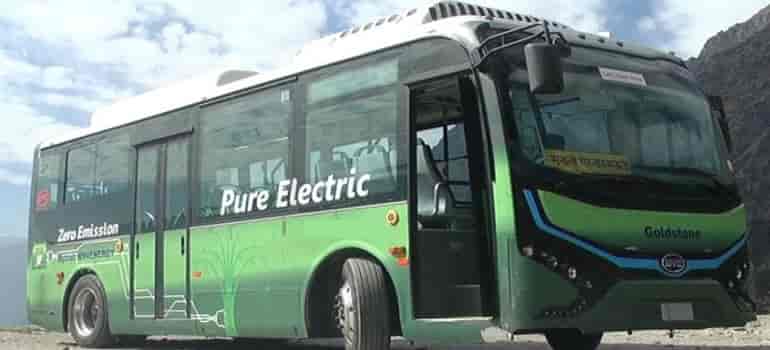
Convergence Energy Services Limited (CESL) has announced prices discovered for the biggest ever demand for electric buses.
The Grand Challenge tender comprises demand for 5450 buses across five major Indian cities – Kolkata, Delhi, Bangalore, Hyderabad and Surat. Prices discovered are the lowest ever and more importantly, at par with or very close to the operational cost of diesel buses.
The lowest price discovered for a 12-meter bus is Rs. 43.49/km, and a 9-m bus is Rs. 39.21/km. This includes the cost of electricity for charging of the buses.
Prices realized set a benchmark for public transport, the price point for which may encourage even the smaller cities to adopt electric vehicles.
Prices discovered represent electric mobility as a “service”, a relatively new and emerging business model that makes it affordable for state transport undertakings to adopt electric buses. In an industry first, the Grand Challenge tender homogenizes demand for electric buses – making this a step closer to standardization of modern public mobility.
The value of the tender is over Rs. 5000 Crores. The buses are expected to operate around 4.71 billion kilometers over twelve years saving 1.88 billion liters of fossil fuel. This will result in 3.31 million tonnes of CO2e from tailpipe emissions, a major step towards mitigating climate change.
Buses will benefit from the central Government subsidy offered under the remodeled FAME II scheme administered by the Ministry of Heavy Industries. With the very low discovered prices under the Grand Challenge, a savings of approximately Rs. 361 Crores of national subsidy can be realized, which in turn may be utilized for additional buses.
The Grand Challenge constitutes best-in-class tender conditions, including standard specifications for buses, depots and charging stations. The contract term is 12 years, with assured kilometers of 10 lacs per bus, and a credible payment security system. Special emphasis was paid to the requirement for domestic content, specifications for which are the highest to date. Atleast 25,000 people will be employed through this tender, of which 10% will be women. This does not include new employment created through new manufacturing facilities.
The process of homogenization started in July 2021, following a Gazette of India notification dated 11th June 2021issued by the Ministry of Heavy Industries. 9 cities are eligible to receive subsidy under the remodeled FAME II Scheme. Of these, 5 have participated in this tender. All major bus manufacturers participated in the tender.
Announcing the discovered prices, Mahua Acharya, MD & CEO, CESL said “The rates we have witnessed today make electric buses extremely competitive across the country. These rates are based on the terms and conditions of the tender and the sheer number of buses that cities have requested. I am very thankful to the many STUs and State Governments who have worked with us tirelessly, NITI Aayog, the Ministry of Heavy Industries and the Ministry of Power, and ofcourse WRI, UITP and the World Bank. I am confident that this mandate will help India to successfully meet the targets envisioned by our Honorable Prime Minister. The Grand Challenge will certainly encourage the faster transition to green mobility across the country while creating a synergy between private operators and state governments.”
Sharing his views, Amitabh Kant, CEO, NITI Aayog said “The successful completion of one of the largest tenders in the of the world of 5450 e-buses is a significant step for the country and its ambitions of electric mobility. The discovery of record-low prices paves the way for the electrification of public transit in a big way. This transparent exercise was also able to achieve harmonization of specification across different cities – Delhi, Kolkata, Bengaluru, Hyderabad and Surat. It shows the collaborative nature of this exercise which resulted in the record fall of prices on per-km basis to as low as 39.21 Rs/KM for 9-m standard floor Non-AC e-bus. I wish to commend CESL and all participating STUs of Delhi, Kolkata, Bengaluru, Hyderabad, and Surat for coming together to make this happen. These initiatives would prove to be landmark steps in India’s electrification of public transportation – providing accessible, affordable, safe and clean transportation to the masses. The successful completion of Grand Challenge will help in fulfilling the endeavor of our Hon’ble Prime Minister Narendra Modi to make India a global leader in the fight against climate change.
Dr. O.P. Agarwal, CEO of WRI India, said: Standardization of the terms and conditions of public mobility across Indian cities that each have unique needs is an extraordinary challenge. WRI has been supporting CESL in this exercise for several months, and I am extremely pleased to see the results today. This is a landmark event for public transit – unprecedented in its size, participation and format. I congratulate STUs, OEMs, the DHI, NITI and CESL for all their efforts in bringing us to this point today.

